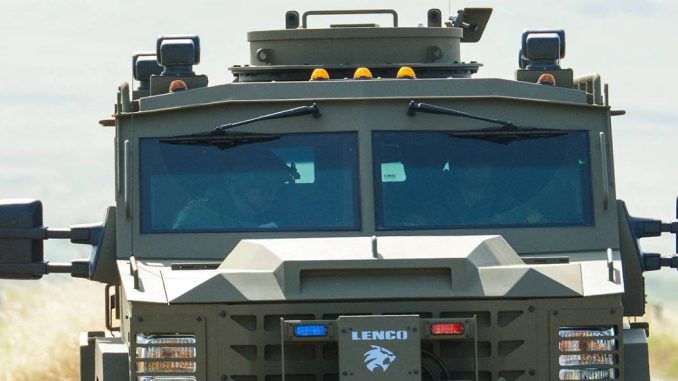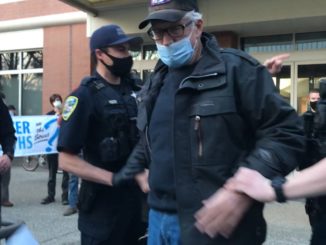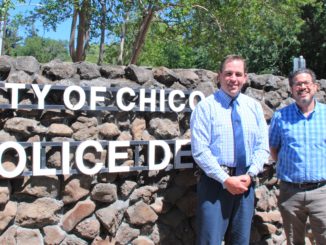
Concerned Citizens for Justice (CC4J), a local police watchdog group, is rallying for public input during the City Council meeting tonight (April 19, 6 p.m.) regarding the adoption of a city ordinance overseeing the Chico Police Department’s acquisition and use of military equipment.
The changes to CPD’s policy and related ordinance were originally included in the City Council’s consent agenda—items approved with no individual discussion and a single stroke of the gavel—at its March 15 meeting, but it was pulled for more in-depth discussion at the request of Council Member Alex Brown.
CPD Capt. Billy Aldridge, who was briefly serving as interim police chief during the recent city manager shuffle, brought it back to council April 5, where it was approved 6-1 (with Brown dissenting) and 14 of 18 public speakers voicing their opposition to the new rules. Unless the council has a change of heart, the ordinance will be finalized with a second reading tonight.
“This is another example of this department’s lack of transparency,” said Margaret Swick at a group gathering last week (April 12). A founding member of CC4J, Swick has previously called CPD’s level of transparency “insular and opaque.”
“The only mention of it [before it appeared on the consent agenda] was on the ‘Regulatory’ section of the police website,” she said. “If they really wanted people to know and give feedback it would have been advertised all over the place, there is no way people wouldn’t have known about it.”
The purpose of CPD’s new Military Equipment Use Policy is, by design, intended to be part of a statewide effort towards greater transparency in policing. Assembly Bill 481 was signed by Gov. Gavin Newsom last September and became law Jan. 1. It allows until April 30 for law enforcement agencies to codify policies about how this equipment is acquired, funded and used.
As that deadline draws near, some agencies have said that supplying equipment inventories and policies the way the law requires will put officers at risk and expose tactics. Aldridge told the CN&R this is possible in Chico: “If our city council didn’t approve to continue use of our inventory we have now, not only would it place our officers at risk but it will have a drastic effect on keeping our overall community safe.”
Law enforcement organizations have been collecting military surplus for decades now, a practice that became increasingly common in the mid-2000s with equipment returning from combat in Iraq and Afghanistan in the wake of 9/11. This so-called “militarization” of American police departments became mainstream news in 2014, as an international audience watched military equipment deployed en masse to quell civil unrest in Ferguson, Mo.
Chico’s biggest controversy over military equipment was arguably the 2011 acquisition of an armored vehicle called a Lenco Bearcat, which many detractors referred to as a “tank.” It was acquired with a Homeland Security grant for $216, 801. An inventory of the city’s military equipment found on CPD’s website with the proposed new rules (Policy 709) notes that Bearcat was destroyed by fire. Aldridge confirmed this, saying the vehicle developed an electrical fire “about 5 years ago,” and that it was replaced with insurance.
The CPD’s current inventory also includes unmanned aerial vehicles (drones); specialized firearms including submachine guns, assault and sniper rifles, as well as non-standard ammunition; flash-bang grenades; chemical agents and smoke canisters; a public address system; and nonlethal weapons and ammo.
“We use these items to bring critical incidents to a safe conclusion,” Aldridge said. “A lot of this helps us de-escalate a situation. There’s really nothing on that list that is so far out there into military land that it even needs to be specially defined as military equipment.”
Aldridge pointed to an April 4 incident in Tehama County where officers engaged in an hours-long standoff.
“This guy was active shooter and luckily [Tehama County law enforcement] had an armored vehicle, a Bearcat. That thing stops rifle rounds, so they were able to get him back from an area away from the community and resolve that situation without him or any officers getting killed.”
The folks at CC4J, on the other hand, argue that police use of military equipment is the polar opposite of de-escalation. George Gold, for one, wondered how officers using heavy weapons and equipment can possibly help de-escalate a dangerous situation or calm an agitated person, and questioned the department’s overall commitment to that goal.
“Even if you grant that the past two chiefs have said, that every officer has now taken de-escalation training, there’s a difference with that training and applying it in the field,” he said. “They shot Tyler Rushing, they shot Desmond Phillips, and they shot Stephen Vest, all without a single attempt at de-escalation.”
While not opposed to the new state law’s intention of transparency, CC4J is speaking out on the militarization of the police department in general, and is advocating for more comprehensive citizen oversight.
CC4J is hosting a Butte County Board of Supervisors candidate forum focused on law enforcement issues on May 5, at 6:30 p.m., at the Chico Women’s Club. Supervisors/candidates Debra Lucero (District 2) and Tami Ritter (District 3) and candidate Peter Durfee (District 2), a CPD sargeant, are scheduled to appear.




“We need these sniper rifles, submachine guns, armored vehicles and grenades to de-escalate a situation.”
George Orwell would be proud.
The five civilians killed recently by Chico PD officers were killed with pistols. The pistols were lethal and effective. There was no need for the “peace officers” to use submachine guns and other lethal military weapons. So why not humanize instead of militarizing the department? Aren’t pistols and automatic rifles proven to be lethal?